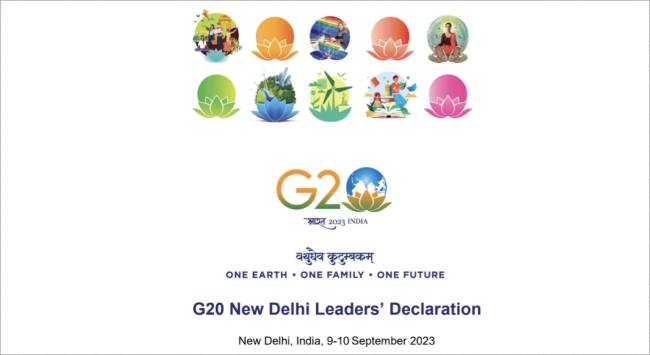The G20 Summit:
Major Policy Directions Mark Credibility of the Process
Amitendu Palit
12 September 2023Summary
India’s G20 presidency delivered a detailed Leaders Declaration, produced by consensus among its members. The Declaration contains policy directions on major economic issues. India will draw satisfaction from enabling these policy directions that ensure the durability of the G20 process.
India successfully overcame the awkward prospect of its G20 presidency failing to deliver a Leaders Declaration based on consensus during the G20 summit in New Delhi on 9 and 10 September 2023. Deep fractions among the global leaders on the Ukraine conflict were a stumbling block. The eventual outcome, while containing ‘consensus’ reflections on Ukraine, has a lot of other substantive content. The Leaders Declaration provides important policy directions on various subjects, including issues that were thematic highlights of the Indian presidency.
Global economic development has been a core mandate of the G20 since its inception. As the world’s most formidable economic group, accounting for more than four-fifths of the world economy, the decisions of the G20 serve as policy directions on major economic challenges for the world. The Leaders Declaration has emphatic perspectives and detailed outlines for policy action by the G20 members on several economic issues. The latter include reforming international financial institutions, managing global debt, and regulating cryptocurrencies and global taxation.
Reforming the international financial institutions has been a high priority for the G20. The imperative in this regard has enhanced after the COVID-19 pandemic. The core thrust of the Leaders Declaration in this regard has been to emphasise the importance of multilateral development banks in becoming nimble and resourceful in handling unforeseen shocks and their specific impacts on emerging markets and developing economies.
Outlined from paragraphs 48 to 53, the Declaration captures the substantive work done by the finance track of the G20 in achieving these objectives. Equipping the World Bank and the International Monetary Fund to address the problems of the small and marginal in the world economy is a theme that resonates across the reform perspective. The resonation is consistent with India’s efforts to highlight the economic difficulties and distress of the Global South and mobilise multilateral financial support for ameliorating the same.
The priorities of the Global South have also been spelt out in the urgency for addressing its external debt vulnerabilities. Paragraph 54 of the Declaration mentions efforts initiated for the resolution of external debt challenges faced by Zambia, Ghana, Ethiopia and Sri Lanka, and presses for the consolidation of more efforts through multilateral frameworks.
There were expectations of the G20 laying down the broad contours of a global regulatory framework for cryptocurrencies. While not outlining the specifics, the Declaration has welcomed the recommendations of the Financial Stability Board on this subject. These recommendations should now become the backbone of prospective overarching global framework for regulating crypto assets (paragraph 58).
The Declaration has further noted the developments on sovereign digital currencies (paragraph 59) for many of its members and their potential implications on the global financial system. On international taxation, the G20 has endorsed the ongoing work by its members and the global community in taking forward the Organisation for Economic Cooperation and Development’s two-pillar taxation framework (paragraph 62).
Considerable excitement has been generated over the launch of the India-Middle East-Europe Economic Corridor (IMEC) during the G20 Leader’s event on partnership for global infrastructure and investment. The initiative comprises eight G20 members – the United States, India, the United Arab Emirates, Saudi Arabia, the European Union, France, Germany and Italy. Comprising rail and shipping links, the IMEC will connect India to the Arabian Gulf, and the Arabian Gulf to Europe. The corridor will focus on enhancing energy and digital connections between India, the Middle East and Europe, including transporting green hydrogen and safeguarding regional supply chains.
The IMEC has invited inevitable comparisons with China’s Belt and Road Initiative (BRI). The geostrategic significance of large-scale infrastructure projects connecting vast economic geographies is unquestionable, given the access they provide to investors over critical resources and markets. The IMEC and the BRI will have overlapping territories. It remains to be seen whether such imbrication will generate new bursts of strategic hostility between the key actors of the two initiatives.
India’s biggest satisfaction would have been in delivering a Leaders Declaration that succeeded in keeping the G20 together by preventing further ruptures. Notwithstanding fissures among members, the fact that they reached a consensus on endorsing an almost 30-page-long detailed document, outlining policy directions on major global economic and development challenges, is an achievement. The outcome ensures that the G20 process survives and retains its credibility.
. . . . .
Dr Amitendu Palit is a Senior Research Fellow and Research Lead (trade and economics) at the Institute of South Asian Studies (ISAS), an autonomous research institute at the National University of Singapore (NUS). He can be contacted at isasap@nus.edu.sg. The author bears full responsibility for the facts cited and opinions expressed in this paper.
Pic credit: G20 Twitter account
-
 More From :
More From :
-
 Tags :
Tags :
-
 Download PDF
Download PDF



